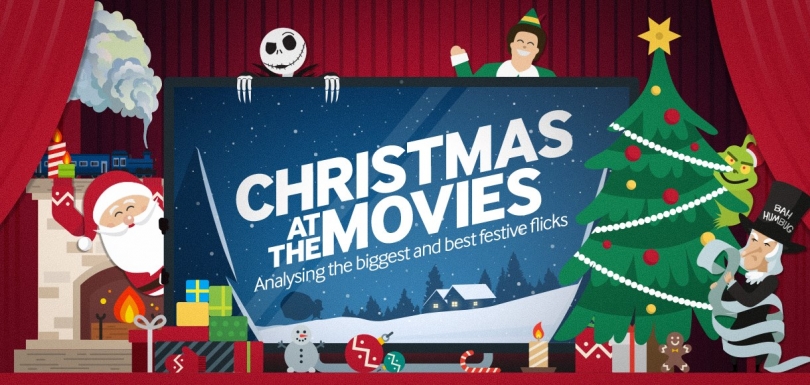|
|
||
|
Pro Tools
FILMFESTIVALS | 24/7 world wide coverageWelcome ! Enjoy the best of both worlds: Film & Festival News, exploring the best of the film festivals community. Launched in 1995, relentlessly connecting films to festivals, documenting and promoting festivals worldwide. Working on an upgrade soon. For collaboration, editorial contributions, or publicity, please send us an email here. User login |
Where have all the great Christmas films gone?
Festive flicks like Last Christmas have been hugely successful at the box office, but the biggest movies aren't always the best.Christmas films are in higher demand than ever before. There’s one problem, though: the recent ones just aren’t very good. Take Last Christmas, the Paul Feig-directed romantic comedy starring Emilia Clarke and Henry Golding, which was released in November. Despite being panned by the critics the George Michael-inspired flick has been a huge success at the box office, grossing $69.7m worldwide in less than a month. The same goes for The Grinch, the 2018 reboot of the Dr Seuss Christmas classic. The animation starring Benedict Cumberbatch received mixed reviews – it has a score of 59 per cent on Rotten Tomatoes – but took over $500m at the box office, making it the second-most successful Christmas film ever behind Home Alone. While festive films still perform very well at the box office, it’s telling that none of the 10 highest-rated Christmas movies on IMDB were released after 2005. Film critic Nicholas Barber – who wrote a scathing review of Last Christmas for the BBC – says the dearth of modern festive classics is the result of a change in the wider film industry. "It’s about budget. Hollywood just isn’t investing in this kind of film anymore," Barber says. "There aren't that many low- or mid-budget British films these days. Everyone's making Star Wars and superhero blockbusters. Then at the other extreme you've got tiny little indie films, experimental arthouse films. "There aren’t many films in the middle, and that’s where most Christmas films would have been." A change may be coming, though. The success of Last Christmas proves that low- to mid-budget romantic comedies, which have been on the decline since the 1990s, can still be a major success at the box office. That’s particularly true in the holidays, when audiences are looking for a pleasant way to spend two hours indoors at the weekend. "It’s almost surprising there aren’t more Christmas films," Barber says. "I thought Last Christmas was painful to watch but the poster's pretty good, it's got a good title, it's got these good-looking young people who are laughing and have nice Christmassy clothes on with snow and twinkly lights. So I can imagine wanting to go and see it. "These obviously do work, this is still a genre where you can spend not that much and do well. Love Actually cemented the idea that you could put a romantic comedy out at Christmas and absolutely make a mint. "If I was a British film producer I'd definitely be making them." That change is already happening on streaming platforms. Netflix released seven Christmas films in November and December this year, five of which were rom-coms. These cheesy flicks, like The Knight Before Christmas and A Christmas Prince: The Royal Baby, wouldn’t necessarily make the cut in the cinema. But they’re cheap to produce, they’re appealing to audiences looking for a feel-good film during the holidays, and they’re easy to binge, making them perfect for Netflix’s platform. Barber says those films are an example of a wider strategy for streaming services. "When [Netflix] do is pump it out," Barber says. "They're behind some really great films, but essentially they're about quantity over quality. "That's not just about Christmas films, that's everything. They put out this massive number of films, which has never been done before. "They've got so much money and it's all about just getting tons and tons of content out there.” It’s easy to criticise the cheap-and-cheerful streaming movies that have effectively replaced straight-to-video releases. Netflix knows these films aren’t going to win any awards. Their fourth-most popular tweet ever made fun of 53 users who had watched A Christmas Prince on 18 consecutive days. They are, however, money spinners that allow Netflix to fund more ambitious, artistic projects. "There's a lot of dross being produced, and yet Amazon or Netflix will fund Roma, or The Irishman – films that get great reviews and are going to win lots of awards," Barber says. "Some people would argue that if you're an arthouse director or auteur, you can get funding for a risky project that you just wouldn't get otherwise, and actually it's a good thing that these people are willing to stump up the money. "In The Irishman you've got Martin Scorsese, Robert De Niro and Al Pacino. They made the film with Netflix because no one in Hollywood would pay for it. "Even though they're pumping out loads and loads of terrible films, maybe it is increasing the quality overall." The Irishman has been an unmitigated success for Netflix. It has a 96 per cent rating on Rotten Tomatoes, and is the favourite to win Best Picture at the Oscars. So when Scorsese receives the green light on his next masterpiece, perhaps he’ll have The Knight Before Christmas to thank.
12.12.2019 | Bruno's blog
|
LinksThe Bulletin Board > The Bulletin Board Blog Following News Interview with EFM (Berlin) Director
Interview with IFTA Chairman (AFM)
Interview with Cannes Marche du Film Director
Filmfestivals.com dailies live coverage from > Live from India
Useful links for the indies: > Big files transfer
+ SUBSCRIBE to the weekly Newsletter Deals+ Special offers and discounts from filmfestivals.com Selected fun offers
> Bonus Casino
User imagesAbout Bruno chatelin bruno chatelin bruno This Blog in french, is managed by Bruno Chatelin It covers the french film festivals circuit with ambience and news. C'est qui Bruno? Co fondateur de filmfestivals.com Fondateur de majorbuzzfactory.com View my profile Send me a message The EditorUser contributions |





























